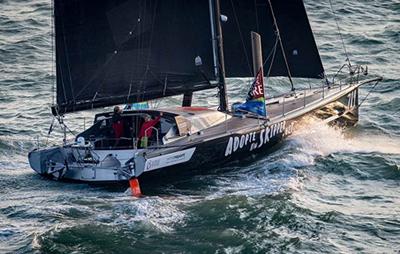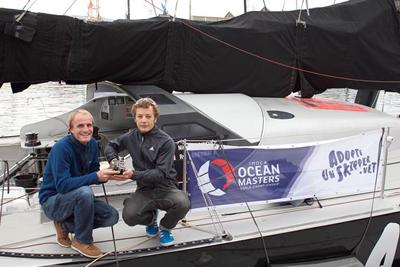Gathering important oceanographic data – from a round-the-world racing yacht

Southampton ocean scientist Dr Max Grand is planning to test his newly developed ocean sensor in some of the most challenging environments on the planet. His idea is to attach it to a round-the-world yacht taking part in the next Vendée Globe single handed race and skippered by his friend Nicolas Boidevézi. This will be a unique opportunity to understand more about dissolved phosphates in the ocean by collecting data four times a day from seawater samples across the globe, which are then analysed on site and the information transmitted back to the National Oceanography Centre (NOC).
Max is a chemical oceanographer who came to the University of Southampton after studying for a PhD in Hawaii. He is interested in learning more about the chemical, biological and physical factors that regulate the distribution of essential nutrients such as phosphates used for marine phytoplankton in oceans around the world. His research activities also include the development of pioneering miniaturised chemical analytical systems that can make automatic measurements for extended periods in remote ocean regions.
At Southampton, Max works in collaboration with NOC’s Ocean Technology and Engineering Group, where he is working on an automated phosphate analyser based on the so-called Lab-on-Chip technology; technology that allows laboratory operations to be carried out using extremely small volumes of sample and reagents. Max’s work is funded through the European Union’s SenseOCEAN project, a consortium of European universities and businesses working towards the development of the next generation of ocean sensors.

The high profile Vendée Globe race starts in November 2016 in the bay of Les Sables d’Olonne in France, close to Max’s home town of La Rochelle. The fleet will sail south, head eastwards past the Cape of Good Hope, cross the Southern Ocean, and return to the Atlantic after rounding Cape Horn. Max says the high profile contest will offer tremendous opportunities to highlight ocean science to a wider audience. “The Vendée Globe is widely regarded as the Everest of the Seas, and attracts considerable media coverage and a great deal of public frenzy, which extends well-beyond the sailing community.
“Apart from the adventure and remarkable sporting feat surrounding the race, the Vendée Globe is also a unique scientific and public outreach opportunity. Sailors cross remote stretches of the open ocean that are rarely visited by scientific research vessels,” he explains. “The race also provides an exciting means to convey the importance of oceanographic research and the role of the oceans in shaping the habitability of our planet in a changing climate.”
During the race, Max will update a blog each week summarising the change in phosphate concentrates around the world as revealed by the data gathered and invite other ocean and Earth scientists at Southampton to contribute posts in areas linked to their expertise.
Further Links
http://www.vendeeglobe.org/en/